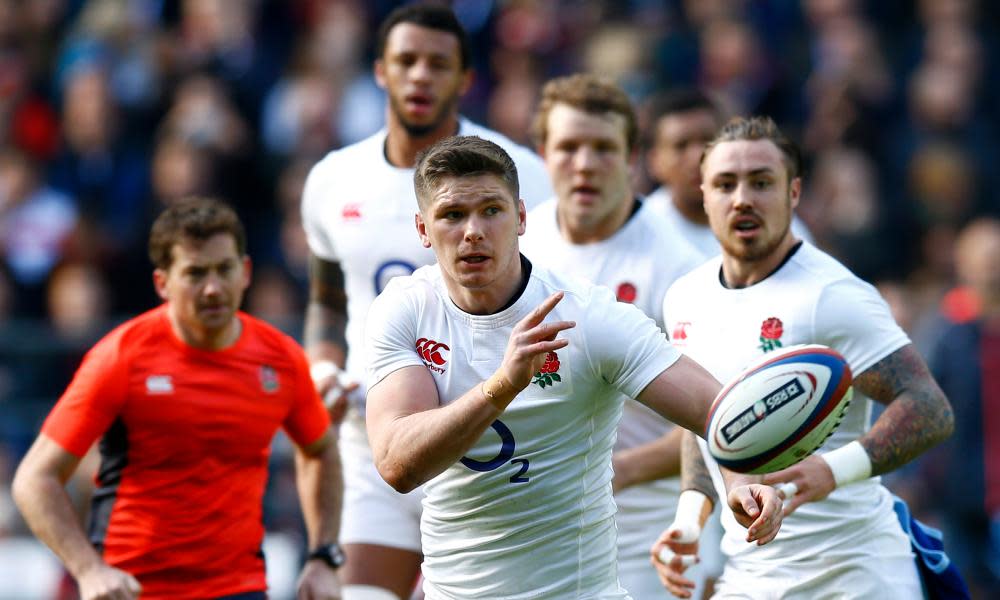Eddie Jones puts faith in Owen Farrell to follow in Jonny Wilkinson’s footsteps

Owen Farrell will win his 50th cap against Italy on Sunday. He may not be England’s captain but he is their most valuable player, and not just because of his goal-kicking as his try-scoring pass to Elliot Daly four minutes from the end of the match against Wales in Cardiff in the last round of the Six Nations, vision allied with precision, demonstrated.
A player who in his early years appeared wooden and drew comparisons with Jonny Wilkinson for his attention to detail, meticulous preparation and comfort in structure rather than broken play, has bloomed under Eddie Jones into a man for all seasons, a match-winner with the ball in his hand as well as on the tee.
When Saracens needed a converted try to draw their European Champions Cup match against the Scarlets in Llanelli last month, it was Farrell who created it with his third defence-splitting break in as many minutes, something he rarely attempted even a few years ago. As his all-round game has developed, so his temperament, which was his one patent weakness, has become equable, so much so that when the Wales No8 Ross Moriarty floored him with a thumping, slightly late tackle in Cardiff two weeks ago that left him winded, he shook his head, got up and resumed his place in the back line. Revenge came in his pass to Daly.
Contrast that with Farrell in the 2015 World Cup when England had fought back from 20-3 down against Australia to 20-13 in a match they had to win to stay in the competition they were hosting. There were 10 minutes to go and the momentum was shifting when Farrell, who had earlier been taken out off the ball, charged into Matt Giteau with his shoulder when the centre was not in possession and was sent to the sin-bin, from where he watched Giteau score the final try in the Wallabies’ 33-13 victory.
“An aura comes from your performance and Owen is starting to develop that because he is so consistent,” says Jones. “He is moving in the right direction and he is developing: he is faster than he was in November, he has got better footwork and his passing and catching are more consistent. I think he will be disappointed that his winning record in his first 50 Tests is less than Jonny Wilkinson’s. I will guarantee that his winning record in his next 50 will be better than Jonny’s.”
Jones, who gave Farrell his senior debut in 2008 when he was in charge of Saracens, puts the 25-year-old’s calmness now down to age, rather than his own influence. “When you are young, you are hot under the collar and do not have patience,” the England head coach says. “He has learned patience with age. You could tell when he was young that he would always be a player driven to be the best; if you have that amount of desire and a reasonable amount of ability, you will be good.”
Farrell made his England debut five years ago against Scotland at inside-centre, the position he has largely occupied under Jones with his friend and fellow rugby league convert George Ford at 10. But, given Warren Gatland’s preference for a hard-running inside-centre, his likely starting position for the British & Irish Lions in New Zealand is at fly-half. He went on the 2013 tour to Australia, an unused replacement in the first two Tests before coming on for Jonny Sexton 17 minutes from the end in the third when the series had been won.
“Owen is wise beyond his years,” says the England wing Jonny May. “He speaks well, carries respect and we all follow someone who is an out-and-out leader. Nothing fazes him and he is an inspiring figure on the pitch. He speaks well during the week and knows the game inside out. He loves the physical side of the game and, when Moriarty smashed into him, he dusted himself off, ready to go again the next time. He is a competitor who wants to be the best.”
It is nearly 14 months since Farrell last tasted defeat, when Saracens lost to Harlequins at the beginning of January last year. Australia in the World Cup was the last time he lost in an England jersey and there was a sense of inevitability about his pass to Daly in Cardiff.
When Saracens were losing to Toulon in the 2014 Heineken Cup final at the same ground, Farrell lost composure towards the end, even bad-mouthing Wilkinson when defeat was confirmed, but the angry young man has matured into a player ready to seize the moment.
There were suggestions Farrell would revert to fly-half on Sunday with Ford dropped to the bench and the ball-carrying Ben Te’o chosen at inside-centre, but the other time Jones took that route, in the first Test in Australia last summer when he chose Luther Burrell at 12, he turned back after 30 minutes. “George and Owen are a brilliant combination at 10 and 12,” says Jones. “They are able to read and control a game and are absolutely outstanding. We will look at other options going forward but they suit us greatly.”
Italy may have hoped for a reprieve after conceding 96 points in the first two rounds and 297 in their last six matches in the Six Nations but, as England close in on New Zealand’s record of 18 successive Test victories for a tier-one nation and their own record of 10 consecutive championship wins, a Saracen is leading their crusade.

 Yahoo News
Yahoo News 
